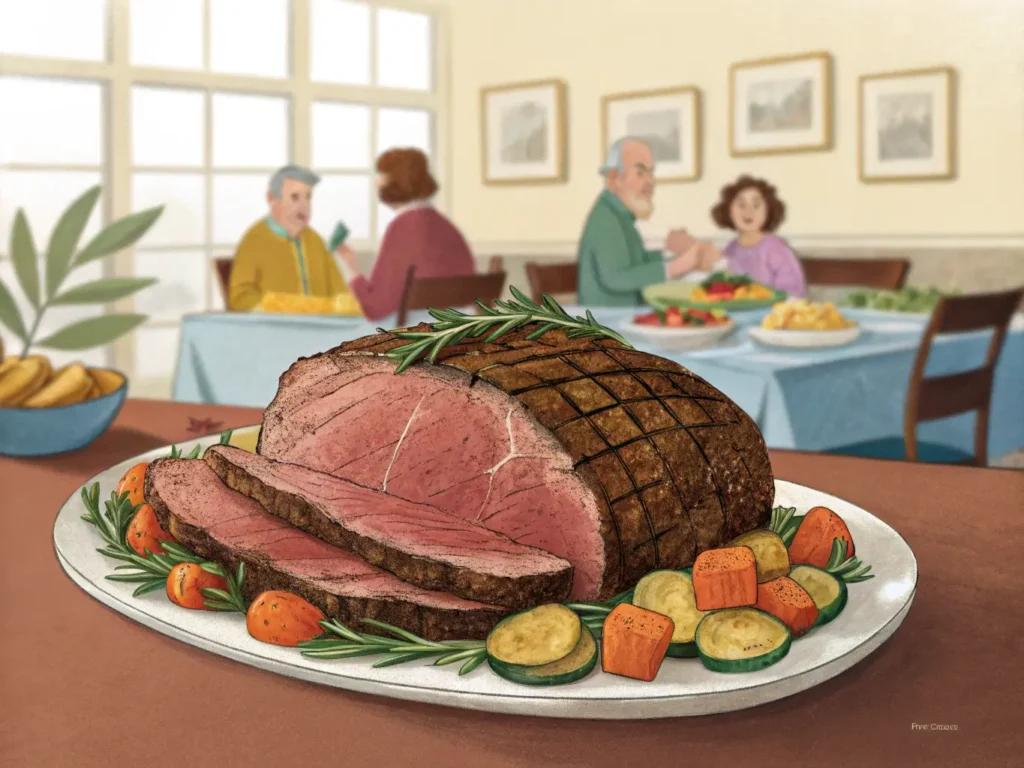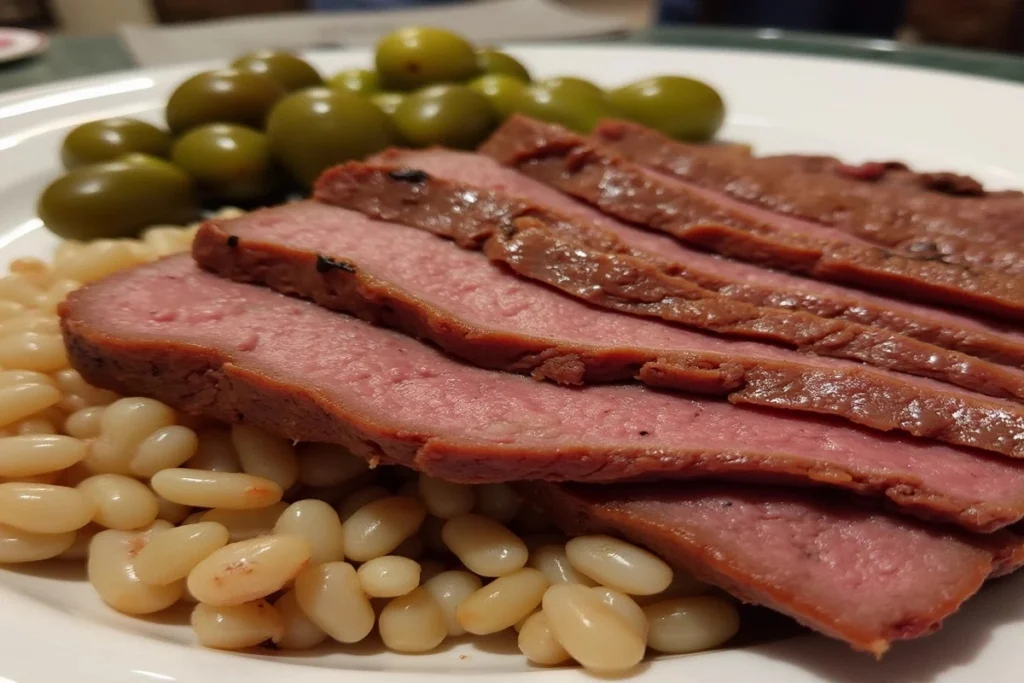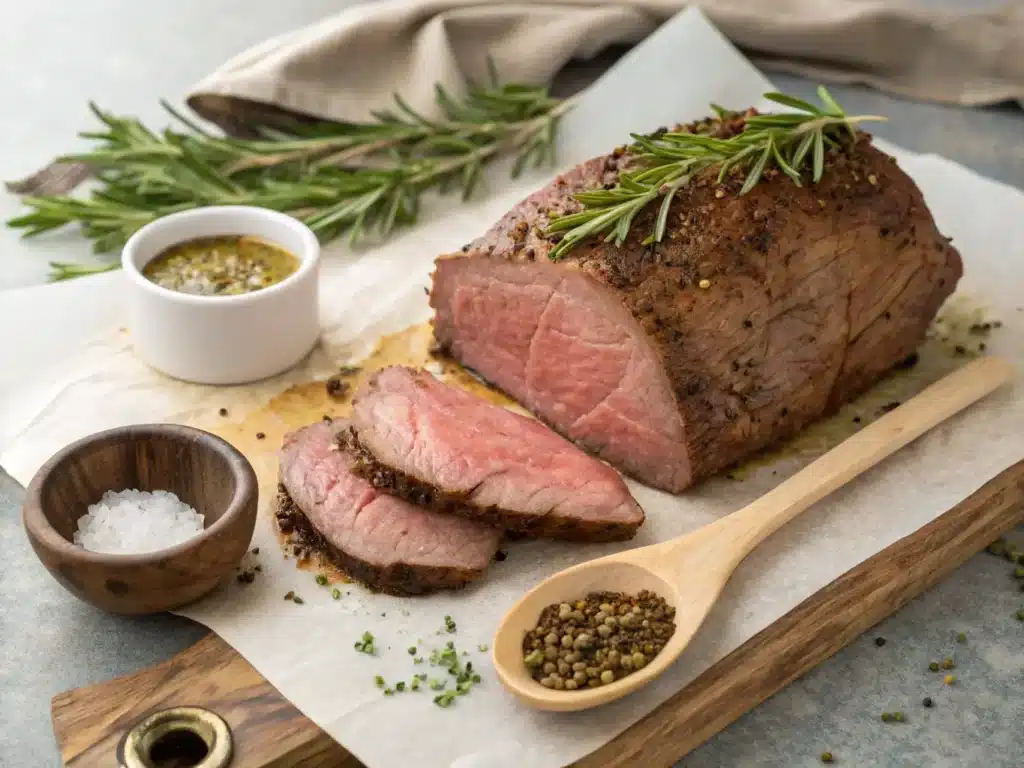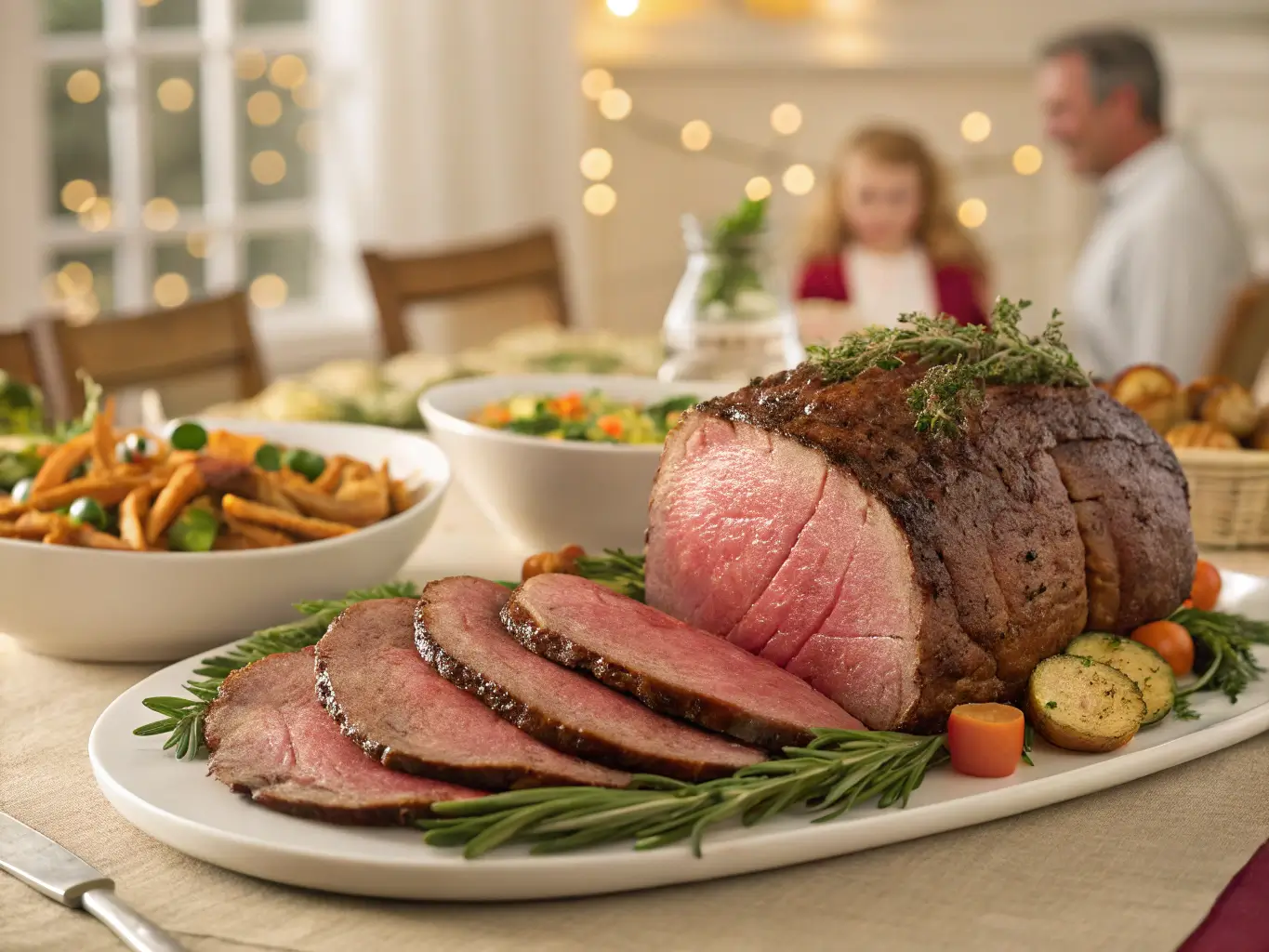Roast beef has long been a favorite at the dinner table, especially when served as a centerpiece for family gatherings or during holiday celebrations. Beyond its rich taste and tender texture, roast beef nutrition is a topic worth delving into. In this article, we’ll explore the nutritional benefits of roast beef, its health impact, and how it can fit into a balanced diet.
What Is Roast Beef Nutrition?
Roast Beef Nutrition is typically a cut of beef that has been roasted in the oven until it reaches the desired level of doneness. It is prepared from cuts such as sirloin, ribeye, or rump, and is well-known for its tender consistency and rich, hearty flavor. But more than its taste, roast beef provides a variety of nutrients essential for good health.
Nutritional Profile of Roast Beef Nutrition
Understanding roast beef nutrition requires examining the macronutrients and micronutrients it offers. Here’s a look at its nutritional profile per 100 grams (approximately 3.5 ounces) of roast beef:
- Calories: Approximately 170 to 200 kcal
- Protein: 26 to 28 grams
- Fat: 7 to 9 grams
- Carbohydrates: 0 grams
In addition, roast beef is a rich source of vitamins and minerals:
- Vitamin B12: Helps maintain nerve health and aids in red blood cell production.
- Iron: Aids in oxygen transport throughout the body.
- Zinc: Supports immune function and contributes to wound healing.
- Selenium: An antioxidant that helps prevent cell damage.
The nutritional content may vary based on the cut of beef used and how it’s prepared. Leaner cuts like eye of round contain less fat but maintain a similar amount of protein.
PrintComprehensive Guide to Roast Beef Nutrition
- Total Time: 1 hr 40 min
- Yield: 8 servings 1x
Description
This classic roast beef recipe is high in protein, rich in iron, and naturally low in carbs. Seasoned simply and roasted to tender perfection, it’s a nutritious main dish great for meal prep or family dinners.
Ingredients
- 3 lb beef top round roast
- 2 tbsp olive oil
- 1 tbsp kosher salt
- 1 tsp black pepper
- 1 tsp garlic powder
- 1 tsp onion powder
- 1 tsp dried thyme
- Optional: fresh rosemary sprigs
Instructions
- 1. Preheat oven to 450°F (230°C). Let the roast come to room temperature for 30–60 minutes.
- 2. In a small bowl, mix salt, pepper, garlic powder, onion powder, and thyme.
- 3. Rub the roast all over with olive oil, then coat with the seasoning blend.
- 4. Place the roast on a rack in a roasting pan. Add rosemary sprigs if using.
- 5. Roast for 15 minutes at 450°F, then reduce oven temperature to 325°F (165°C) and continue roasting for 1–1.5 hours, or until internal temperature reaches desired doneness (130°F for medium-rare).
- 6. Remove from oven and tent loosely with foil. Rest for 15–20 minutes before slicing thinly against the grain.
- 7. Serve warm or chilled in sandwiches, salads, or with sides.
Notes
- Use a meat thermometer for best results.
- Leftovers can be stored in the fridge up to 4 days or frozen for longer storage.
- Roast beef is naturally low in carbs and high in protein, making it ideal for keto or high-protein diets.
- Prep Time: 10 min
- Cook Time: 1 hr 30 min
- Category: Main Dish
- Method: Roasting
- Cuisine: American
Nutrition
- Serving Size: 4 oz
- Calories: 220
- Sugar: 0g
- Sodium: 280mg
- Fat: 12g
- Saturated Fat: 4.5g
- Unsaturated Fat: 7.5g
- Trans Fat: 0g
- Carbohydrates: 0g
- Fiber: 0g
- Protein: 27g
- Cholesterol: 75mg
Keywords: roast beef, protein rich, iron rich, beef roast, healthy meat recipe
Is Roast Beef Nutrition Healthy?
You might be wondering: how healthy is roast beef? The answer depends largely on how it’s cooked, how much is eaten, and an individual’s overall dietary needs.
Protein Powerhouse
One of the standout qualities of roast beef nutrition is its protein content. Protein is an essential macronutrient that plays a key role in building and maintaining muscle mass. This makes roast beef an excellent option for those looking to boost their protein intake, including athletes and those trying to preserve lean body mass.
Low in Carbohydrates
Roast beef contains virtually no carbohydrates, making it suitable for low-carb and ketogenic diets. It’s also naturally gluten-free, which is an added advantage for people with gluten sensitivities.
Rich in Iron and Vitamin B12
Iron and vitamin B12 are critical nutrients for maintaining energy levels and ensuring that red blood cells function correctly. roast beef nutrition is one of the richest sources of both, which makes it an ideal option for preventing anemia, particularly among individuals who may be prone to deficiencies.
Moderate Fat Content
The fat content in roast beef nutrition can be beneficial, providing necessary fatty acids. However, the cut you choose plays a role in how healthy it is. Lean cuts, such as top round, contain less saturated fat compared to ribeye. Therefore, when opting for roast beef as a meal, selecting a leaner cut can help minimize the intake of unhealthy fats while still getting plenty of flavor.
Balanced Consumption
While roast beef provides many essential nutrients, it should be consumed as part of a balanced diet. It’s important to consider portion sizes and balance it with vegetables and whole grains. Including vegetables like roasted carrots, Brussels sprouts, or mashed potatoes not only adds more fiber but also helps balance the macronutrient content of the meal.
The Benefits of Eating Roast Beef Nutrition
Adding roast beef to your diet can offer several benefits. Here are some of the key health advantages:

1. Muscle Building and Maintenance
Roast beef is a great source of high-quality protein, which helps promote muscle growth and repair. For individuals who are physically active or looking to build muscle, including roast beef in their diet can be beneficial.
2. Supports Immune System
Zinc, present in roast beef, plays an important role in boosting immune function. It contributes to the body’s ability to fend off illnesses, making roast beef a beneficial addition, particularly in colder months when immune function might be challenged.
3. Boosts Energy Levels
Vitamin B12 in roast beef helps convert food into energy, which can support an active lifestyle. B12 is also crucial for maintaining the health of nerve cells and preventing fatigue.
4. Iron for Blood Health
Roast beef is an excellent source of iron, an essential mineral that helps produce hemoglobin, the protein that carries oxygen in the blood. Adequate iron intake is vital for avoiding iron-deficiency anemia, especially for women and growing children.
Frequently Asked Questions About Roast Beef Nutrition
How Healthy Is Roast Beef?
Roast beef can be quite healthy, depending on the cut of meat and preparation method. Opting for leaner cuts and keeping portion sizes reasonable can ensure you’re getting plenty of nutrients without excessive fat or calories.
What Is the Nutritional Content of Roast Beef?
The nutritional content of roast beef per 100 grams includes about 26 to 28 grams of protein, 7 to 9 grams of fat, and around 200 calories. It’s also rich in vitamins B12, zinc, iron, and selenium.
What Are the Benefits of Eating Beef?
Beef, including roast beef, is an excellent source of protein, vitamins B6 and B12, iron, and zinc. These nutrients contribute to muscle maintenance, immune function, and overall energy levels.
Is a Roast Beef Dinner Healthy?
A roast beef dinner can be healthy if prepared with attention to balance. Choosing lean cuts, pairing with plenty of vegetables, and avoiding high-calorie sauces can make it a nutritious and balanced meal.
How to Incorporate Roast Beef Nutrition into a Balanced Diet
Incorporating Roast Beef Nutrition into a balanced diet is easy if you pay attention to portion sizes and side dishes. Here are a few tips:
- Pair with Vegetables: Roast beef is rich in protein and iron, but pairing it with vegetables like leafy greens, carrots, or broccoli adds important vitamins and fiber.
- Opt for Whole Grains: Serve your roast beef with whole grains, such as quinoa or brown rice, to create a balanced meal that includes fiber and complex carbohydrates.
- Choose Lean Cuts: For a healthier option, select lean cuts like eye of round or top sirloin. This helps reduce saturated fat while still providing great flavor and nutrients.
- Keep It Simple: Avoid excessive use of heavy gravies or sauces. Instead, season your roast beef with herbs, garlic, and a small amount of olive oil to add flavor without adding unnecessary calories.
Cooking Tips for Healthier Roast Beef Nutrition
- Trim Visible Fat: Before cooking, trim any visible fat from the Roast Beef Nutrition. This can help reduce the overall saturated fat content of the meal.
- Slow Cooking: Using a slow cooker or roasting at a lower temperature can result in tender, flavorful roast beef without needing to add large amounts of fat.
- Use Fresh Herbs: Fresh herbs like rosemary, thyme, and oregano add flavor without the need for additional salt or fats. These herbs can also provide their own set of health benefits.

Different Cuts of Roast Beef and Their Nutritional Value
The nutritional value of Roast Beef Nutrition can vary depending on the cut of meat. Here are some of the most popular cuts used for roast beef and their nutritional properties:
1. Ribeye Roast
- Calories: 290 kcal per 100 grams
- Protein: 24 grams
- Fat: 21 grams
- Benefits: Ribeye roast is well-marbled, providing a rich flavor due to the higher fat content. While it’s not as lean as other cuts, it provides a good source of protein and iron.
2. Top Round Roast
- Calories: 150 kcal per 100 grams
- Protein: 30 grams
- Fat: 4 grams
- Benefits: Top round roast is one of the leaner cuts of beef, making it a great choice for those looking to reduce fat intake. It’s still rich in protein and essential nutrients like iron and vitamin B12.
3. Sirloin Tip Roast
- Calories: 200 kcal per 100 grams
- Protein: 28 grams
- Fat: 8 grams
- Benefits: Sirloin tip roast is a versatile cut that strikes a balance between flavor and leanness. It contains a moderate amount of fat, providing both taste and nutritional benefits.
4. Eye of Roast Beef Nutrition
- Calories: 130 kcal per 100 grams
- Protein: 29 grams
- Fat: 3 grams
- Benefits: Eye of round is a very lean cut, which makes it a good choice for those looking to limit fat while still getting a high protein content. It’s also a great source of iron.
Roast Beef Nutrition and Dietary Considerations
Roast beef can be a suitable option for a wide variety of dietary needs and preferences. Here are some specific dietary considerations:
1. Low-Carb and Keto Diets
Since roast beef contains virtually no carbohydrates, it is an excellent option for individuals following low-carb or ketogenic diets. Its high protein and fat content make it suitable for those who need to keep carbs low while maintaining energy levels.
2. Gluten-Free Diets
Roast beef is naturally gluten-free, making it a safe choice for individuals with celiac disease or gluten intolerance. Just be cautious of any sauces or seasonings used during cooking, as these can sometimes contain gluten.
3. High-Protein Diets
For those who require higher levels of protein, such as athletes or bodybuilders, roast beef is a great option. With 26 to 28 grams of protein per 100 grams, it helps meet daily protein requirements and supports muscle growth and recovery.
4. Low-Fat Diets
If you’re trying to reduce your fat intake, choose lean cuts like top round or eye of round. These cuts provide all the nutritional benefits of roast beef while minimizing the amount of saturated fat consumed.
The Role of Roast Beef Nutrition in Meal Planning
Incorporating roast beef into your weekly meal plan can be a delicious way to ensure that you are getting enough protein and essential nutrients. Here are some meal planning tips to get the most out of roast beef:
- Batch Cooking: Roast beef is an ideal candidate for batch cooking. Prepare a large roast, then use leftovers in a variety of dishes throughout the week. Sliced roast beef can be used in sandwiches, salads, and wraps for quick and nutritious meals.
- Portion Control: Keep portion sizes in check to maintain a balanced diet. A typical serving size is about 3 to 4 ounces of cooked roast beef.
- Balanced Plates: Aim to fill half your plate with vegetables, a quarter with roast beef, and a quarter with whole grains. This ensures a balanced meal that provides protein, fiber, and complex carbohydrates.
Roast Beef Nutrition and Heart Health
While beef often gets a bad reputation for its fat content, it can still be part of a heart-healthy diet when consumed in moderation and paired with other nutritious foods. Here are some ways roast beef nutrition can fit into a heart-healthy diet:
- Choose Lean Cuts: Opting for lean cuts like top round or eye of round can help reduce saturated fat intake, which is important for maintaining heart health.
- Limit Added Sodium: When preparing roast beef nutrition, avoid using excessive salt. Instead, use herbs and spices to add flavor without increasing sodium levels, which is crucial for heart health.
- Balance with Vegetables: Including a variety of colorful vegetables alongside roast beef can help provide fiber and antioxidants, both of which are important for cardiovascular health.
Roast Beef Nutrition vs. Other Proteins
How does roast beef compare to other protein sources like chicken, pork, or plant-based proteins? Here’s a look at how roast beef stacks up against other popular options:
Roast Beef vs. Chicken
- Protein Content: Both roast beef and chicken are excellent sources of protein, but roast beef generally contains more iron and vitamin B12 compared to chicken.
- Fat Content: Chicken breast is leaner than most cuts of roast beef, making it a better choice for those focused on reducing fat intake.
- Nutritional Benefits: Roast beef provides more zinc and iron, which are important for immune function and blood health.
Beef vs. Pork
- Protein Content: Roast beef and pork are both high in protein, but beef tends to have a slightly higher protein content per serving.
- Fat Content: Depending on the cut, pork can be either leaner or fattier than roast beef. Pork tenderloin, for example, is comparable to lean cuts of beef.
- Nutritional Benefits: Roast beef has higher levels of vitamin B12, while pork contains more thiamine, a B vitamin that helps with energy metabolism.
roast beef nutrition vs. Plant-Based Proteins
- Protein Content: Plant-based proteins like lentils, chickpeas, and tofu can provide a good amount of protein, but they often require larger serving sizes to match the protein content of roast beef.
- Nutritional Benefits: Roast beef is rich in vitamin B12 and iron, which are typically found in lower amounts in plant-based proteins. However, plant-based proteins are lower in fat and contain fiber, which is beneficial for digestive health.
- Dietary Considerations: For those following vegetarian or vegan diets, plant-based proteins are the preferred option. However, for individuals looking for a complete source of protein with all essential amino acids, roast beef is a strong contender.
Delicious Roast Beef NutritionRecipes to Try
If you’re inspired to incorporate roast beef into your meals, here are some delicious recipes to try:

1. Classic Oven Roast Beef Nutrition
Ingredients:
- 3-pound top round roast
- 2 tablespoons olive oil
- 3 cloves garlic, minced
- 1 tablespoon fresh rosemary, chopped
- 1 tablespoon fresh thyme, chopped
- Salt and pepper to taste
Instructions:
- Preheat your oven to 350°F (175°C).
- Rub the roast with olive oil, minced garlic, rosemary, thyme, salt, and pepper.
- Place the roast in a roasting pan and cook for about 1.5 to 2 hours, or until the internal temperature reaches your desired level of doneness.
- Let the roast rest for 10-15 minutes before slicing.
2. Slow Cooker Roast Beef Nutrition
Ingredients:
- 4-pound chuck roast
- 1 onion, sliced
- 3 carrots, chopped
- 3 cloves garlic, minced
- 1 cup beef broth
- 1 tablespoon Worcestershire sauce
- Salt and pepper to taste
Instructions:
- Place the onions, carrots, and garlic in the bottom of the slow cooker.
- Season the roast with salt and pepper, then place it on top of the vegetables.
- Pour the beef broth and Worcestershire sauce over the roast.
- Cover and cook on low for 8-10 hours, or until the beef is tender and easily shredded.
3. Roast Beef Nutrition Salad
Ingredients:
- 2 cups mixed greens
- 4 ounces cooked roast beef, thinly sliced
- 1/4 cup cherry tomatoes, halved
- 1/4 cup cucumber, sliced
- 2 tablespoons red onion, thinly sliced
- 1 tablespoon balsamic vinaigrette
Instructions:
- Arrange the mixed greens on a plate.
- Top with sliced roast beef, cherry tomatoes, cucumber, and red onion.
- Drizzle with balsamic vinaigrette before serving.
Final Thoughts on Roast Beef Nutrition
Roast beef is a nutrient-dense food that can be part of a healthy diet when consumed in moderation. It is packed with protein, essential vitamins, and minerals, making it a great option for those looking to increase their intake of these nutrients. However, choosing leaner cuts and pairing roast beef with vegetables and whole grains can ensure a well-balanced and healthy meal. As with any food, moderation is key to reaping its benefits without consuming too much fat or calories.
Looking for a smarter swap? The Best Gluten Free Quiche Recipe offers all the savory satisfaction without any gluten fuss.

